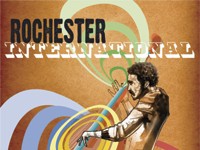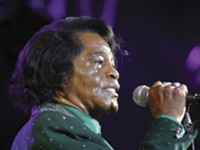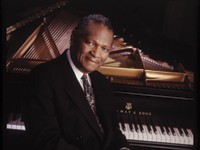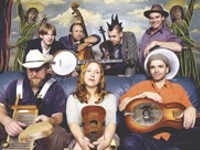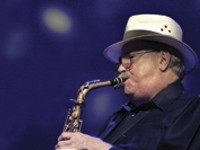At the age of 84 Toots Thielemans has lived through much of the history of jazz. You can hear it in his playing. From plaintive blues, through swinging rhythms, to the be-bop boldness of his improvisations, Thielemans has absorbed it all. The Belgium native speaks six languages, but none are as powerful as his seventh: harmonica.
Thielemans will be sharing the stage with keyboard virtuoso Kenny Werner at the Eastman Theatre during the Rochester International Jazz Festival.
In a wide-ranging discussion with City Newspaper, Thielemans sometimes breaks into song to illustrate a point. He speaks with humility about the ironies and world-shaking contingencies that shaped his life and career.
"I wouldn't be the same person if it were not for that blue note that came from Africa via America," says Thielemans. "Imagine if there had been no slavery. No Louis Armstrong, no Billie Holiday, no Lester Young, no Charlie Parker. They would be Africans. They were contaminated by Western music. It's dangerous to speak like that but it's true."
Thielemans' first role model was an accordion player who passed the hat for change every Sunday in the Brussels café operated by Thielemans' parents. In his crib, 3-year-old Jean (his real name) mimicked the squeezebox motions with a shoebox until his father bought him a cardboard accordion. Later, the records of pioneering harmonica player Larry Adler inspired him to buy his first harmonica.
It was another earth-shaking event, the German invasion of Belgium during World War II, that exposed Thielemans to American jazz. At the time he was 18, studying mathematics and planning to become a teacher. He was horrified to see his Jewish schoolmates going into hiding or being picked up and sent to labor camps.
One byproduct of the war was an influx of jazz into Belgium. Music by Bix Beiderbecke, Duke Ellington and others became available. Thielemans couldn't resist a nearby record store where he recalls the proprietor saying, "'Jean, you must buy this record: Louis Armstrong et les Mills Brothers.'"
He won a guitar by betting a friend that he could figure out a Fats Waller tune in 10 minutes. When he bought some 78rpm records by Gypsy guitarist Django Reinhardt he began his real studies.
"You know the phonograph you have to wind up and change the needle? I still have it in our house in Brussels," says Thielemans. He taught himself to read music from a Duke Ellington folio that included "Sophisticated Lady," "It Don't Mean a Thing," "The Mooch" and "Drop Me Off in Harlem."
"To me it was exotic," says Thielemans. "In my little room in Belgium. I learned the guitar from the 78s of Django and the grammar of jazz from the piano folio of Duke. Then Django played in Brussels. It was amazing. I put the harmonica away and tried to become a guitarist. I became a decent one, too."
After liberation came the explosion of be-bop. Thielemans started to play in officers' clubs and make a little money. As for his education: "A combination --- I got sick and music taking over --- I flunked at university the first year."
During the war Thielemans visited an uncle in Miami. Jazz photographer Bill Gottlieb heard him jamming and took him to 52nd Street in New York, where he sat in on guitar with J.J. Johnson, Hank Jones and Howard McGhee. The great bebop agent, Billy Shaw, was there. Thielemans recounts their conversation:
"'Hey, you're good. Where you from?'
'I'm from Brussels.'
'I know, that's in Copenhagen.'"
Back in Belgium, Thielemans sent Shaw some records he had made. One of them ended up on the record player of Benny Goodman, leading to a European tour with Goodman's septet in 1950.
After moving to the United States in 1952 Thielemans lived another dream, playing with Charlie Parker's All Stars in Philadelphia. "The All Stars were Miles, Milt Jackson and me. [Parker] was very hospitable to me, he even asked me to share his dressing room. Here I am sharing the dressing room with my guru. Right after that I got a steady job with George Shearing. Five years, the only steady job I ever had."
Although he was a good guitarist, Thielemans began to attract attention with his more unique instrument, the harmonica. He made a Columbia recording in 1954 and there was no turning back.
Aside from his virtuosic playing, Thielemans wrote one of the greatest jazz standards, "Bluesette." "It was fate; in France they say fatalité," he explains. In 1962, in Brussels, I wound up sharing the dressing room with [jazz violinist] StephaneGrappelli. I tuned my guitar, I swear to you, and the chords of "Bluesette" come out. Stephane says, 'It's beautiful, Toots.' I said, 'Stephane, you inspire me, you don't realize.'
"I called it 'Bluet,' the French name for the corn flower in the summer," Thielemans continues. "I go back to Sweden with that song. The 's' was added by a producer there. He said, 'It's blues, no?' I tried it on harmonica; it was not the right feeling. I did it with the guitar and whistle and take four was the good one." (Thielemans sings his brilliant improvised melody that distinguished that seminal track.)
You don't have to be a jazz aficionado to know the music of Toots Thielemans. His harmonica enhanced the soundtrack of Midnight Cowboy and his whistle livened up the memorable Old Spice commercials. Generations of children have grown up hearing his harmonica on the Sesame Street theme song.
Lately, the accolades are piling up. In January Thielemans was awarded the "Diploma de Excelência" by Brazilian Minister of Culture (and jazz artist) Gilberto Gil. And in March he was honored at a Carnegie Hall concert where luminaries like Herbie Hancock and Joe Lovano paid tribute to him. Thielemans' joined the performers on harmonica.
"It's a very fragile instrument - little reeds --- but what the harmonica can do, it can almost speak. When I play a Jacques Brel song, I play the words. A saxophone cannot do that," he says.
In recent years inner ear problems have hampered his whistling skills and a stroke has slowed down his left hand, but Thielemans is still going strong.
"I'm not complaining --- I'm still here," he says.
Still here, indeed. Every year, Thielemans is a shoe-in to be at or near the top of the Down Beat Critics and Reader's Polls under "Miscellaneous Instrument." Perhaps legendary trumpeter Clifford Brown said it best: "The way you play the harmonica, they shouldn't call it a miscellaneous instrument."
Thielemans takes it a step further: "I play a miscellaneous instrument, but I'm not a miscellaneous musician. It's not because you play a Stradivarius that you're a great musician."
The Toots Thielemans/Kenny Werner Duo and the McCoy Tyner Trio play at the Eastman Theatre, 26 Gibbs Street, on Wednesday, June 14, at 8 p.m., as part of the Rochester International Jazz Festival. $27.50-$50. www.rochesterjazz.com.

